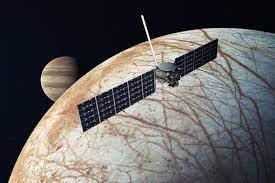A £1.4 billion probe will be sent into space in a few days on an eight-year journey to look for evidence of life on other solar system planets. However, the spacecraft will not travel to nearby locations like Mars. Instead, it will take off for a deep space survey of Jupiter’s far-far ice moons. This will start a new era in the search for extraterrestrial life.
Researchers from four of the top institutions in the world have joined forces to study the origins of life on Earth and search for other places in the universe where biological processes resemble our own.
At the American Association for the Advancement of Science annual meeting in Washington on Saturday, the universities of Cambridge in the UK, Harvard, and Chicago in the US, and ETH Zürich in Switzerland announced the foundation of what they called the Origins Federation.
“We want to find out if there are any regions around Jupiter where life might have originated. We need to choose a location with both liquid water and internal energy, according to mission project scientist Olivier Witasse.
He added, “We have good reasons to believe that there is more water than on Earth with the icy moons of Jupiter.”
Didier Queloz, the initiative’s leader and a professor at both Cambridge and ETH, stated, “I believe that life is embedded into the laws of physics of the universe.” In the 1990s, he shared in the discovery of the first exoplanet, which is a planet that orbits a star other than the sun.
Results might be ground-breaking. If it is discovered that life has independently evolved twice within our own solar system, it is likely to be present throughout the galaxy.


